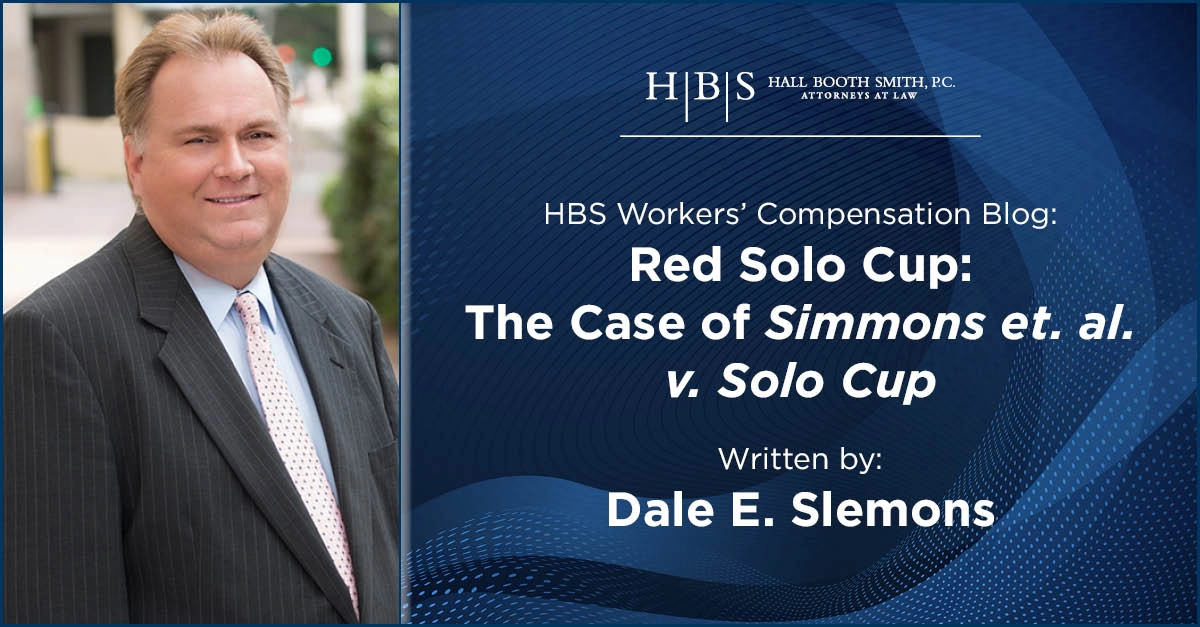
Red Solo Cup
Introduction
It is safe to say most of us have enjoyed a beverage, adult or otherwise, in a red solo cup. When we hear “Solo Cup,” many of us think of tailgates, picnics, or perhaps the late Toby Keith’s song “Red Solo Cup,” but did you know that red solo cups are made by the Dart Container Corporation in Conyers, Georgia and have been made since 1936? Behind the familiar red cup lies a legal battle that goes far beyond the product itself, reaching into the heart of workplace safety and employee rights. In Simmons et al. v. Solo Cup Operating Corporation, the Georgia Court of Appeals recently issued an opinion in a case involving a wrongful death claim that highlights critical questions about employer responsibilities and safety protocols.
A Closer Look at the Case
On October 7th, 2024, the Georgia Court of Appeals pinned an opinion regarding the manufacturer of red solo cups. The story behind this case is both tragic and complex. In an unexpected turn of events, an employee at the Solo Cup manufacturing facility in Conyers, Georgia, was killed following an incident that stemmed from returning lost property. According to court records, the employee discovered a bag containing several identification cards in a restroom at the facility. Following company policy, the employee turned the bag over to his supervisor, who, after some back-and-forth, returned it to the owner.
Upon obtaining his bag the rightful owner discovered that $400 was missing and asked his supervisor to identify the individual that initially found the bag. The rightful owner confronted the individual who promptly denied taking the $400. Unconvinced by the employee’s denial, the owner became angry. He shot and killed the employee that had initially found the bag.
The deceased employee’s heirs filed a wrongful death action against the Red Solo Cups alleging they negligently hired and retained and negligently failed to keep its promises safe. However, the employer filed a motion for lack of subject matter jurisdiction action requesting that the lawsuit be dismissed based on the Georgia Workers Compensation Act mutual exclusivity provision. The trial court granted Red Solo Cup’s motion to dismiss based on that argument.
A Legal Twist: The Court’s Decision
The case progressed to the Georgia Court of Appeals, which disagreed with the lower court and agreed with the deceased employee’s heirs allowing their lawsuit to proceed. The court cited exceptions to the exclusivity rule noting that for an injury to be considered as arising out of the employment it must either be caused by activity the employee engaged in as part of his or her job or their injury must result from some special danger to the employment. The trial court found that by following the employer’s policy/procedure the employee was performing duties arising out of their employment; However, the Court of Appeals rejected that argument. It found that the deceased employee returning the bag was a separate incident from the denial of taking the money which resulted in the rightful owner’s anger and shooting. It noted that the returning of the money to the rightful owner whether in compliance with one’s work rules was merely a proverbial Good Samaritan act, and the death was entirely unrelated to the performance of work and that the Georgia workers compensation act’s mutual exclusivity provision did not apply.
Reflections on Workplace Safety and Responsibility
For employers, the Simmons et al. v. Solo Cup case underscores the importance of maintaining a safe and controlled environment beyond the physical operations and policies. Incidents that may seem incidental or isolated can escalate in unforeseen ways, and companies need to account for more than just physical hazards—they must also be vigilant about potential interpersonal risks and conflicts among employees.
For employees, this case brings attention to the potential risks associated with even seemingly simple acts of kindness or adherence to policy. It raises an uncomfortable question: should employees worry about the potential personal risk when simply trying to do the right thing?
Moving Forward: What This Case Could Mean for Georgia Workers
As we await further developments in this case, one thing is clear: the outcome could influence how courts view wrongful death suits under the Georgia Workers’ Compensation Act. It also serves as a wake-up call for employers across the state to reconsider the comprehensiveness of their safety protocols, training, and conflict de-escalation policies. In the end, the case serves as a stark reminder that every employee has the right to a workplace where they feel safe—physically and emotionally.
Disclaimer
This material is provided for informational purposes only. It is not intended to constitute legal advice nor does it create a client-lawyer relationship between Hall Booth Smith, P.C. and any recipient. Recipients should consult with counsel before taking any actions based on the information contained within this material. This material may be considered attorney advertising in some jurisdictions. Prior results do not guarantee a similar outcome.
Blog Overview
About the Author
Dale E. Slemons
Partner | Atlanta Office
T: 404.954.6929
E: dslemons@hallboothsmith.com
Dale Slemons focuses his practice on workers’ compensation. Dale has represents Employers, Insurers, and Third-Party Administrators in the defense of their workers’ compensation claims. His clients include construction companies, hospitals, carpet manufacturers, aviation industrial corporations, self-insured companies, and insurance companies.




Leave a comment
You must be logged in to post a comment.